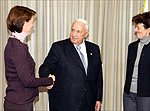On April 19, in an interview with Svenska Dagbladet, German Filmmaker Klaus Dexel described his disappointment at the reaction of Peter Wallenberg when some years ago he asked him about a document containing new information about actions the Wallenberg Family had taken in the 1950’s in the Raoul Wallenberg case. Peter Wallenberg simply chose to ignore the question. But Klaus Dexel is right: The document does deserve serious attention.
The paper sheds important light on the behind-the-scenes role in the Raoul Wallenberg investigation by one of the most elusive parties in the case, the Wallenberg family. It is an internal interview report from SÄPO, (dated September 15 and 22, 1954 respectively) which was forwarded to UD by SÄPO’s Chief Inspector Otto Danielsson. A Swedish businessman by the name of Ernst Natander had reported an unusual conversation he had had in March 1954 with one of Jacob Wallenberg’s close associates, Carl Hardeberg, then a director in Industri-Diesel. According to Natander, Hardeberg had told him that a Major “Tärnström” (sic) of the Swedish Defense Staff was “traveling around Europe to establish contact with firms which had connections to Russia.” Through these contacts, Hardeberg added, “Tärnström” “hoped to obtain information about Raoul Wallenberg.” Would Natander support these efforts? Most interestingly, Hardeberg indicated that ” …the Wallenberg Family was ready to make a large sacrifice for discovering what happened to Raoul.”
